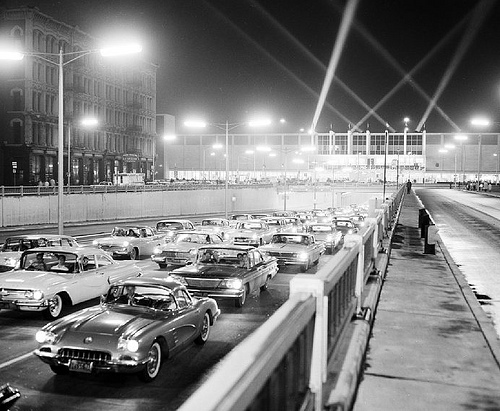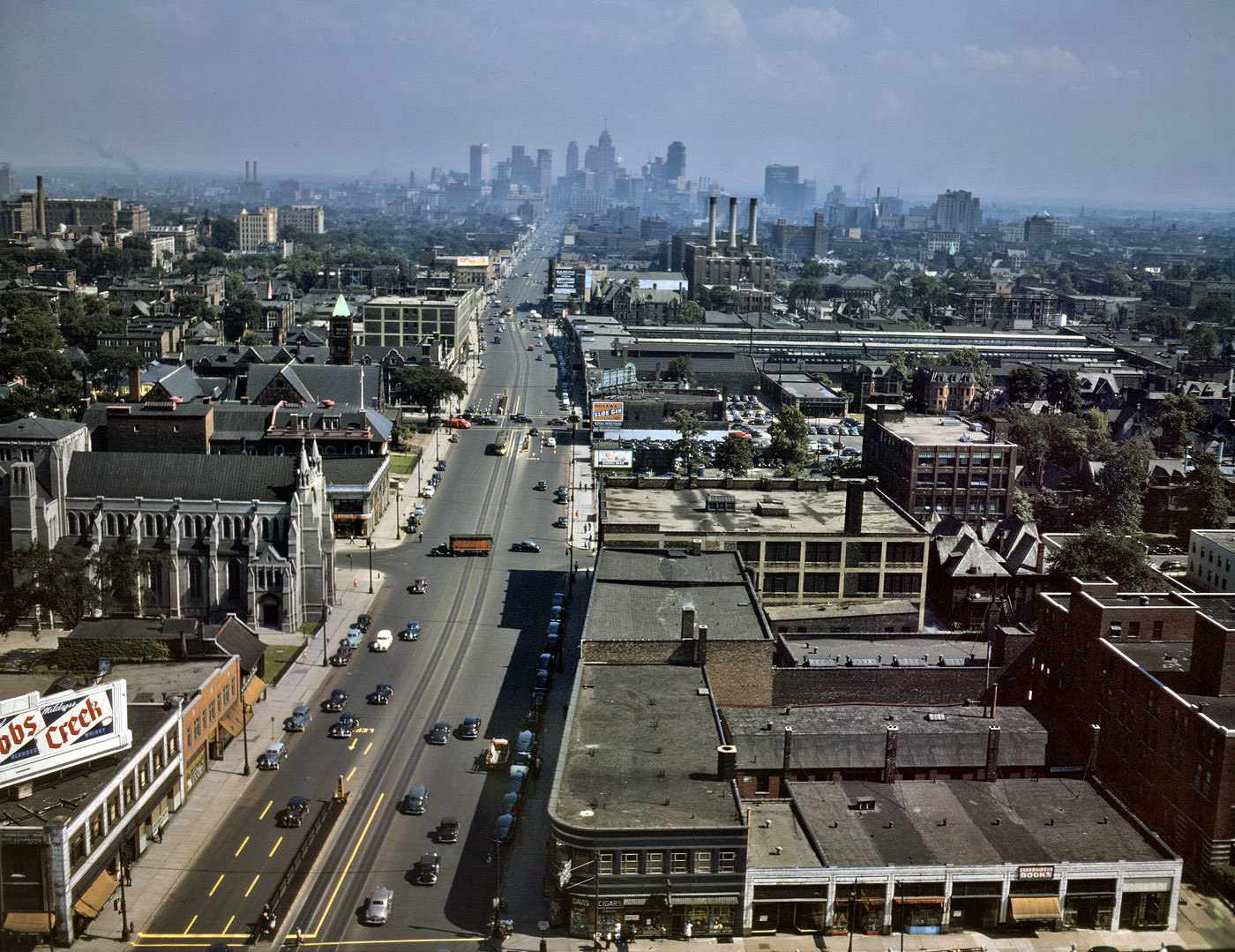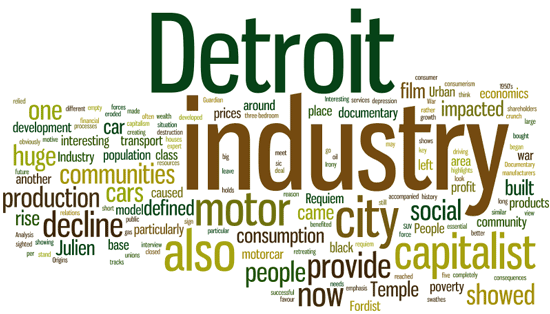I just watched the Julien Temple documentary ‘Requiem For Detroit’ which showed the damage and destruction of communities, in particular black communities when the Capitalist Motor Industry decides to leave town.
Preview of the film:
BBC Documentary: Requiem For Detroit from Logan Siegel on Vimeo.
What was interesting about this documentary is that it highlighted how the Fordist capitalist model of production impacted on the development of Detroit. With the motorcar industry there also came the rise in the use of the motorcar and the development of the suburban way of life and consumerism. It also showed that today’s Detroit has has the stirrings of what a post capitalist societal model may look like.
 The film showed the rise of the fordism and the manufacturing processes that accompanied it and also briefly showed the impact of the 1930’s depression (similar situation to the one we face now) and how it caused social strife, poverty and deprivation culminating in battles between working class people in unions and the Car Industry. It was only the second world war which saved the motor industry as they then began producing vehicles for war. War benefited the capitalist ruling class of the motor industry as it provided a huge demand for resources and products.
The film showed the rise of the fordism and the manufacturing processes that accompanied it and also briefly showed the impact of the 1930’s depression (similar situation to the one we face now) and how it caused social strife, poverty and deprivation culminating in battles between working class people in unions and the Car Industry. It was only the second world war which saved the motor industry as they then began producing vehicles for war. War benefited the capitalist ruling class of the motor industry as it provided a huge demand for resources and products.
The motor industry was also key in the decline of public transport in favour of personal transport, with motorways being built instead of train tracks. This also precipitated the rise of the suburbs that are completely reliant on the car which in turn increases the dependency on the car. This obviously benefits the manufacturers. They also used standardised ways of making cars, but designed the shell to appeal to different social groups, thus creating aspirational consumption. People defined themselves through their cars, having a better car (sic) defined you as a successful person.
 This was all showing how capitalist social relations and consumption defined a city. Then came the decline of the motor industry, with the emphasis on big SUV cars the industry was not prepared to deal with the huge increase in oil prices during the 1970s and after. People then wanted smaller less gas consuming cars which were produced outside of Detroit and this impacted hugely on the industry. The city relied on one industry to provide for it and when this industry was no longer able to provide it caused huge problems.
This was all showing how capitalist social relations and consumption defined a city. Then came the decline of the motor industry, with the emphasis on big SUV cars the industry was not prepared to deal with the huge increase in oil prices during the 1970s and after. People then wanted smaller less gas consuming cars which were produced outside of Detroit and this impacted hugely on the industry. The city relied on one industry to provide for it and when this industry was no longer able to provide it caused huge problems.
So, Detroit is now currently a city in capitalist decline, its tax base is now eroded and it is unable to provide social services to its population resulting in huge consequences, as Julien Temple states in a guardian interview.
“One in five houses now stand empty. Property prices have fallen 80% or more in Detroit over the last three years. A three-bedroom house on Albany Street is still on the market for $1. Unemployment has reached 30%; 33.8% of Detroit’s population and 48.5% of its children live below the poverty line. Forty-seven per cent of adults in Detroit are functionally illiterate; 29 Detroit schools closed in 2009 alone.”
But it appears that the community is beginning to organise itself to meet its needs through community gardening through the Detroit Urban Agricultural Network which has been setup to provide people with spaces to grow their own food. This is essential as most supermarkets have left the area, again another sign of capitalism retreating as the potential for profit decreases.
The reason Detroit is interesting as a case study and I hasten to add I am definitely no expert on the place, is that it shows how a place can be impacted upon by modes of production. The Fordist mode of production built the city on the back of the motor industry and then with the decline of the this industry the area suffered massively. This highlights how a city based on one capitalist industry driven by economics and growth can often be short sighted. Detroit as a capitalist city has not been particularly resilient to the economic forces that once benefitted it. This has devastated the communities of Detroit as they developed to serve this industry, particularly large swathes of black communities who came in from the south to work for the motor industry.
The Irony is that it was the people of Detroit who built up the motor industry and made these businesses their profits through production and consumption of their goods as they also bought many of the products themselves during the consumer boom of the 1950’s onwards. Yet that wealth has long left the city to go to shareholders and chief executives. This is what happens when you base a city around one industry, but also around an industry with the profit motive as its driving force, rather than having a system of economics where the person/community is at the centre.
Is this what the future holds for a lot of us, in the UK our reliance has been on the financial industry to provide income and this is now in decline and combined with the credit crunch puts us in a very precarious position. What do people think?
More Information:
Detroit Wikipedia
Interesting Guardian Article challenging requiem for detroit
Interview with Julien Temple about the film
Analysis of Thomas J. Sugrue’s “The Origins of The Urban Crisis” another view of Detroit history

